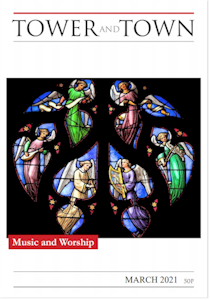

Tower and Town, March 2021 (view the full edition) (view the full edition)Music In WorshipBefore coming back to base in Marlborough, Sibella and I lived and worked in several places that placed us in wildly different churches with sometimes unexpected styles of worship. So we were exposed to, and came to appreciate, kinds of music in worship that lay far from our traditional Anglican upbringing. In this piece I ask you to accompany me across some strange borders. To go back to the beginning: our parents brought us up in a musical and church-going household, so I was soon singing in the village church choir. Our regular service (I'm talking 1950s!) was Matins, so lots of psalms and canticles - and actually I came to love the genius of the 19th century English musicians who found this clever way (the Anglican chant) of perpetuating the wonderful poetry of David's psalms. After University I started in the Foreign Office and, while working in London for a year, joined the Bach Choir. At my audition David Willcocks asked me why I wanted to. I answered that I had sung Bach's B minor Mass at school, and the Bach Choir offered the opportunity to sing the St Matthew Passion, Bach's other great choral work. He let me in! (Probably he was short of tenors.) Despite often being presented in performance, these two fantastic works reveal Bach's faith on every page. My first Foreign Office posting abroad was in Saudi Arabia, where I served again 20 years later. 'Church' was a home-grown affair, all non-Muslim worship being illegal. Our congregations were small, organised in the meeting rooms or social clubs of Western embassies. Mostly we had no priest (and so no eucharist) and shared among ourselves the duties of leading services. We sang hymns and worship songs, accompanied on electric keyboards, so our music - while enthusiastic - was simple. But one weekend we did something special. British and American congregations got together for a camping weekend in the desert some miles out of Riyadh, where we would be out of reach of police. And at dawn in the sand dunes we had our service, with hymns accompanied by a scratch band of portable instruments, including my accordion. Wonderful! Between these two postings in Saudi Arabia we were in Cairo in the 1980s, and in Prague in the early 1990s. The Anglican Church in Egypt was, and is, well organised. We worshipped in the hall of the British School, pending the completion of the cathedral building, and I was a regular parish organist for a while. We even organised a 'sing-along' Messiah, relatively unusual in those days. Prague offered wonderful opportunities for playing and listening to (mostly traditional) music in church settings, in those heady days following the Velvet Revolution, when the Communists' restrictions on Christian worship were lifted. The last few years of my Foreign Office career were in Oman and Kuwait, where (as in other Gulf states, but not - of course - Saudi Arabia), governments allocate generous places for Christian churches to operate. Because of the huge expatriate (mostly Asian) communities, there are dozens of congregations, using every imaginable style of worship, including dancing as well as singing. From there, in strong contrast, we moved to a place almost at the epitome of traditional Western church music - Cambridge. With two world-class choirs in King's and St John's Colleges, and over 20 other colleges having their own chapels and chapel choirs, there is endless opportunity for attending services adorned with beautifully-performed liturgical and other sacred music. How spoilt we were. Back in Marlborough, I find I am as much involved in music in worship as ever, playing the organ in up to five churches in the Upper Kennet Benefice - and, once again, the accordion for carol services held outside because of Covid restrictions on services within churches. For worship, anything goes!  Church service in the Saudi Arabian desert Stuart Laing |